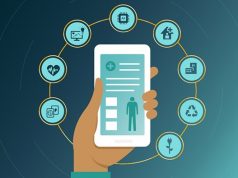Any crime committed primarily or entirely on the Internet is called cybercrime. Security vulnerabilities and identity theft are examples of cybercrime. Other types of cybercrime include “revenge porn,” “cyberstalking,” “harassment,” “bullying,” and “child sexual abuse.” Anyone who uses the internet should take a few precautions. Here are 10 tips to help you protect yourself from the various types of cybercrime.
How To Protect Yourself Against Cybercrime?
When you hear about the various types of cybercrime, you may be tempted to give up using the internet. That’s probably a little drastic.
Instead, learning how to identify cybercrime is the first step toward better protecting yourself and your data. Taking some basic precautions and knowing who to contact if you see someone engaging in illegal activity online are important. So let’s find out how to protect yourself from cyber threats.
Use A Full-Service Internet Security
There are several internet security services that can protect you from malware, ransomware, and viruses. This is particularly important when you want to protect yourself from ransomware attacks which are the most expensive of all cybercrime threats, with average damages of $2.4 million for businesses.
Ransomware is also infamous for its financial ramifications, with the average ransom demand now at $679. Ransom hackers can make over $90,000 a year on average.
Use Strong, Unique Passwords
Passwords, particularly complicated ones, are difficult to remember, which is why so much effort is put into finding better alternatives. However, it’s important to use unique passwords that are different for each site, rather than easy-to-guess passwords like “123456” or “password.” Choose ones with a minimum of 14 characters.
Start with a favorite sentence and only use the first letter of each word after that. If you want to add complexity, use numbers, punctuation, or symbols, but length is more important. Be sure to update any factory-set default passwords, such as those included with your Wi-Fi router or home security gadgets. A password manager can assist you in creating and remembering complex and stable passwords.
Recognize Email Phishing
Phishing is the most common form of cybercrime, and it typically involves tricking the victim into falling for scams such as handing over their passwords.
If the scammers have the password, they can easily hack the company’s system or change bank account information.
The deception usually entails users being asked to download and install malware. In certain cases, ransomware is installed, providing an opportunity for attackers to make money.
To protect your email, you should use an SPF record. Sender Policy Framework (SPF) records allow domain owners to publish a list of IP addresses or subnets that are authorized to send emails on their behalf. The aim is to eliminate spam and fraud by making it far more difficult for spammers to hide their identities. To ensure that everything is in order, use the SPF record checker tool.
Keep Your Software Updated
Always keep the operating system and internet security applications up to date. Cybercriminals can find a way to manipulate bugs and gain access to your device if you ignore it. This can start a chain reaction, leaving you vulnerable to attacks.
The majority of computer companies release updates on a daily basis to defend against newly discovered vulnerabilities.
Keep the operating systems and applications up to date switching on automatic updates to make things easier. Also, make sure you have apps installed to check your device for viruses and malware, in case anything gets through. Some of this security software is free.
Control Your Social Media Settings
Keep your personal and confidential information safe. With only a few data points, social engineering cybercriminals can also obtain your personal information, so the less you post publicly, the better. If you post your pet’s name or your mother’s maiden name, for example, you risk revealing the answers to two popular security questions.
Fortify Your Home Network
Starting with a strong encryption password and a virtual private network is always an ideal idea. All traffic leaving your devices is encrypted before it reaches its destination, thanks to a VPN. If cybercriminals manage to break through your communication line, they will only be able to read encrypted data. When using a public Wi-Fi network, whether, in a library, café, hotel, or airport, it’s a good idea to use a VPN.
Take Precautions To Protect Yourself From Identity Fraud
Identity theft happens when someone illegally obtains your personal information by deceit or fraud, usually for financial gain. For example, you could be duped into giving personal information over the internet, or a criminal could steal your mail to gain access to account information. That is why it is important to protect your personal information. A VPN, or virtual private network, can help protect the data you send and receive over the internet, especially when using public Wi-Fi.
So it is a good idea to know how to protect your identity. There are some things you can do to help prevent criminals from obtaining your personal data. This includes not posting your travel plans on social media and using a VPN while using your hotel’s Wi-Fi network to access the internet, etc.
Protect Your Kids From Cyber Threats
Children often fall prey to identity thieves because their Social Security numbers and credit records are mostly clean and understandable. When it comes to sharing your child’s personal data, you can help prevent identity fraud by exercising caution. It’s also a good idea to be aware of the signs that your child’s identity has been compromised.
Use Multi-factor Authentication
In certain cases, websites ask users to log in not only with a strong password but also with a separate code received from an app, text message, or email message. Multi-factor authentication is an extra measure, though it isn’t ideal, but makes it much more difficult for a hacker to gain access to your accounts.
Enable multi-factor authentication whenever possible, particularly for sensitive log-ins like bank and credit card accounts. As an even more advanced level of security, you might consider having a physical digital key that connects to your device or smartphone.
Backup And Encrypt Your Most Sensitive Information
Encrypt the data on your smartphone and device if possible. If a hacker copies your files, all he gets is gibberish, not your address book or financial records. This sometimes entails the installation of software or the modification of device settings. Some manufacturers do this without their customers’ knowing, which helps to increase protection.
It’s important to hold backups of data that are important, such as medical records or family images. These backups can preferably be duplicated, with one stored locally on an external hard drive that is only connected to your primary computer on a periodic basis, and the other stored remotely, such as in the cloud.
Conclusion
If you think you have been a victim of cybercrime, you can contact the local police department, as well as the FBI and the Federal Trade Commission in some cases even if the crime seems minor. Your report could help police with their investigations or prevent criminals from exploiting other citizens in the future.
These are some of the steps you should consider:
- Make contact with the businesses and banks where you suspect there has been fraud;
- Set up fraud warnings and obtain copies of your credit reports;
- Report identity fraud to the Federal Trade Commission.
No person, organization, or computer can be 100% protected. Even the most secure systems can be broken into by anyone with enough patience, resources, and ability. However, by taking these steps, you can reduce the chances of becoming a victim while also helping to increase the overall standard of cyber hygiene in your communities, making everyone safer both online and offline.
Follow Technoroll for more!






